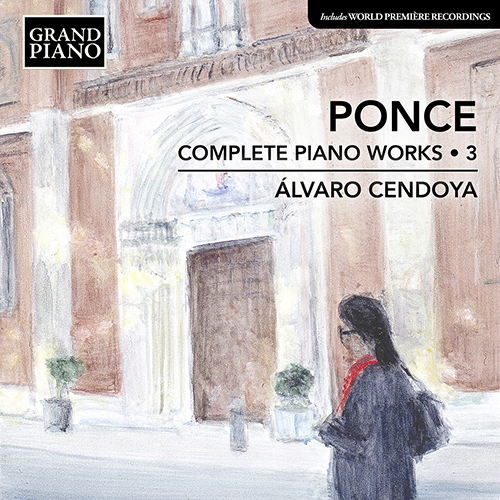Álvaro Cendoya continues with the challenge of recording the complete piano works of the Mexican composer Manuel M. Ponce, the father of Mexican nationalism. The pianist from San Sebastian, a professor at Musikene, is excited to get one of his “classic” pieces to reach two million plays on Spotify. Cendoya pointed out that the challenge is to record eight all-Ponce albums. He is recording the fourth one at Musikene. Cendoya has been focused on teaching and recording, but now he would like to return to concerts and make contact with the public. © 2023 El Diario Vasco

The Mexican Turina? It was a surprise to listen to this album, which I can’t help but recommend as a Melómano de Oro because of its valuable content. Listening to the thirty-three tracks that make up its duration of almost 70 minutes has moved me. For those of us who live with, from and for music, it is not easy to be impressed by what is new just because it is new; on the contrary, we can recognize greatness in the absence of artifice, in the quality of the essential and beautiful message. What beauty in Ponce’s pages! His harmonization, in the ninth of the easy pieces, of the famous Mañanitas, written by his countryman Alfonso Esparza Oteo (a native of Aguascalientes, where he lived since he was a child with his eleven siblings), or the precious and modernist ‘Preludio galante’ of his Estudios de concierto, together with the rest of the works that we can listen to on this disc, the third volume of his integral piano works, show the profound knowledge of the instrument and the excellently informed intuition of the composer and pianist, Manuel María Ponce, who perfected his studies as a performer under the guidance of Martin Krause, a disciple of Franz Liszt.
Ponce’s work, like that of Turina, Albéniz, Falla or Granados, should not be absent from the teaching guides of any conservatory, Spanish or otherwise. Absolutely contemporary of the Sevillian composer, born in the same 1882 as him (also as Stravinski, in another aesthetic side of the polyhedral modernism) and died a year before don Joaquín (1948), Manuel María Ponce drinks from that super Romanticism that is aligned with Modernism as in Andrés Triapello’s Los nietos del Cid (The grandchildren of the Cid), with a certain wink to fantasy, even circus-like, that could remind us of the seductive Broadway as heir to that Beidermeier, with a level of quality in its elaboration similar to what, in my own hands, I found when recording all of Turina’s work. I don’t know how many volumes Ponce’s piano oeuvre will occupy, but I would love to know it all. Listening with a pianist’s ears, maybe something would be different, but what Álvaro Cendoya does seem to me irreproachable. Bravo! © 2023 Melómano (Spain)
Cendoya’s playing throughout is musically charming, technically accomplished…I can promise that there is a good amount of music that may be new to many listeners, and all captured in excellent sound. Here’s looking forward to Cendoya’s next Ponce album! © 2022 Fanfare Read complete review
Cendoya is in full command of every etude… Most of the music here is rewarding and has me looking forward to Volume 4, which should arrive any year now. © 2022 American Record Guide Read complete review on American Record Guide
Spanish pianist Álvaro Cendoya is on a mission to generate more interest in this composer’s piano music, by being the first musician to record all of Manuel Ponce’s output for the instrument, over a series of 8 volumes. The pieces presented here in Volume 3 of this complete cycle cover a wide range of styles and techniques. Álvaro Cendoya well captures and projects each one’s character, be it joyful or sad.
…the world premiere recording on this CD, the Vespertina (Evening Song) reminds us that music need not be complicated to be evocative, especially when played here with the deepest expression by Álvaro Cendoya. If you enjoy piano music, consider making room in your collection for the unjustly overlooked piano music of Manuel Ponce. © 2022 Classical Music Sentinel Read complete review
According to the notes Manuel Ponce was a leading light in Mexican nationalist music. These are lovely performances of music which is sometimes lyrical, sometimes more rhythmic and virtuosic. His music shows varied influences from the Western Romantic pianistic tradition to local folk and dance music. The CD presents these works, from the first four decades of the 20th Century, in a well balanced programme. © 2022 Lark Reviews
After a gap of almost five years, it is with great pleasure I welcome the third disc in a complete recording of piano music by the Mexican composer Manuel Maria Ponce.
Born in 1882, his mature musical education found him in Paris with Dukas as his mentor, his return to Mexico marked by a career as a concert pianist. As a composer he was to produced a vast quantity of music over a very wide genre from songs to orchestral scores. For the keyboard he was a miniaturist, though in his one substantial work here—the Estudios de Concierto—he combined seven studies of a substantial length to reach its thirty-one minute total length. As the opening, Preludio tragico carries the weight that belies the oft quoted description that his music is ‘suitable for fashionable restaurants’, while the finale demands considerable finger agility. As a whole I would commend the work to you. Elsewhere we are mostly in the world of cameos, some lasting just a few seconds in the 20 Piezas Faciles. I was particularly happy to discover the two Mazurkas from around 1917, and of whatever magnitude or importance, each of the 33 tracks are played with the same affection and appropriate brilliance by the Spanish-born, and London-trained, Alvaro Cendoya. The Spanish recording is exemplary. © 2022 David’s Review Corner

































